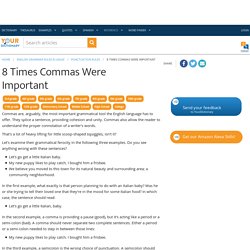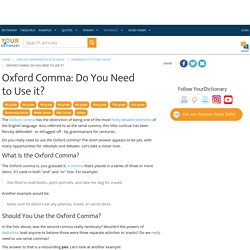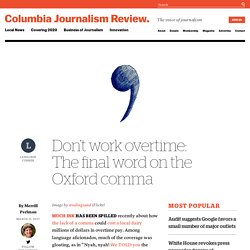

Oxford Comma: Yes or No? A Compilation of Opinions and Recommendations. By Daniel Scocco First things first: what is the Oxford comma?

Also called serial comma, it is a comma placed after the penultimate item in a list and before the conjunction “and” or “or.” Here’s a sample sentence without the Oxford comma: We traveled to China, Thailand and Japan. And here is the same sentence with the Oxford comma: We traveled to China, Thailand, and Japan. 8 Times Commas Were Important. Let's examine their grammatical ferocity in the following three examples.

Do you see anything wrong with these sentences? Let's go get a little Italian baby. My new puppy likes to play catch, I bought him a frisbee. We believe you moved to this town for its natural beauty and surrounding area; a community neighborhood. In the first example, what exactly is that person planning to do with an Italian baby? Let's go get a little Italian, baby. Oxford Comma Survey Needed a Third Option - Copyediting.com. The data-analyzing folks at FiveThirtyEight sought to assess where America stands on the Oxford comma, and the results told us very little.

A survey of 1,129 people found 57 percent favor a serial comma when presented with a simple series and 43 percent said leave it out. Presumably, “I don’t care” was not an option. In my experience, the Oxford comma elicits the most passion among its proponents, many of whom have expressed solidarity with me on the assumption that, as a thinking man, I must support its use. I do have an opinion, but it is probably unsatisfactory to anyone who has a strong feeling on the matter. Oxford Comma Survey Needed a Third Option - Copyediting.com. The data-analyzing folks at FiveThirtyEight sought to assess where America stands on the Oxford comma, and the results told us very little.

A survey of 1,129 people found 57 percent favor a serial comma when presented with a simple series and 43 percent said leave it out. Presumably, “I don’t care” was not an option. The Oxford Comma. Welcome to your GrammarBook.com E-Newsletter.

Free BONUS Quiz For You! [[firstname]], because you are a subscriber to the newsletter, you get access to one of the Subscription Members-Only Quizzes. Click here to take a Commas Quiz and get your scores and explanations instantly! "So convenient...hundreds of quizzes in one click. " [[firstname]], Subscribe to receive hundreds of English usage quizzes not found anywhere else! Take the quizzes online or download and copy them.Get scored instantly.Find explanations for every quiz answer.Reproduce the quizzes to your heart's content.EASY to use.No software to download.No setup time.A real person to help you if you have any questions!
"Fun to test my skills! " Your choice: Subscribe at the $29.95 or $99.95 level ($30 off - regularly $129.95). "I download the quizzes for my students who don't have computer access. " Subscribe today to receive hundreds of English usage quizzes not found anywhere else! "Makes learning English FUN! " Oxford Comma Dispute Settled. Eleven months ago, in our newsletter of March 29, 2017, we passed along to you the newspaper article “Lack of Comma Costs Company Millions in Dispute.”

Serial Killer - Columbia Journalism Review. Oxford Comma: Do You Need to Use it? The Oxford comma has the distinction of being one of the most hotly debated elements of the English language.

Also referred to as the serial comma, this little curlicue has been fiercely defended - or shrugged off - by grammarians for centuries. Do you really need to use the Oxford comma? The short answer appears to be yes, with many opportunities for rebuttals and debates. Let's take a closer look. Did Oxford Drop the Oxford Comma? I’m always on the lookout for hot grammar news, and this week, we had some.

Twitter went crazy with news that the Oxford University Press had changed their style guide to drop the Oxford comma. It turns out, it was a false alarm. The Oxford Comma, in Pictures. Don’t work overtime: The final word on the Oxford comma. Image by stealingsand (Flickr) We have also spilled much ink over that tiny punctuation mark.

The comma is in some ways the wimpiest of punctuation marks, signifying a tap on the brakes rather than a full stop or sharp turn. But when it comes to its place in a series or list of items, that little comma creates enemies out of best friends. In our view, the argument should not be over the Oxford comma, but over clarity. In the case at hand, whether drivers were entitled to overtime pay hinged on this single passage, which specified that the people exempt from overtime were involved in: The canning, processing, preserving, freezing, drying, marketing, storing, packing for shipment or distribution of:Sign up for CJR's (1) Agricultural produce;(2) Meat and fish products; and(3) Perishable foods.
Serial Comma. Here's a listener: Hi, Grammar Girl. This is Patti from Houston... Everyday Grammar: Oxford Comma. Accessibility links Languages VOA Learning English PreviousNext Breaking News Live Everyday Grammar TV.

Serial Comma. BONUS: The Oxford comma. Commas: Oxford, Appositive, Nonrestrictive. Commas are a workhorse punctuation mark. They’re like the people you ride with on the subway every day, the delivery guy who comes by your office, and the parents of your children’s classmates—you see them so often that you think you know them just from sheer exposure. Rarely does a paragraph go by in which you don’t encounter a comma. But like those familiar strangers, commas are complex. You might get a sense of them from casual observation, but to truly know them, you have to dig deeper.